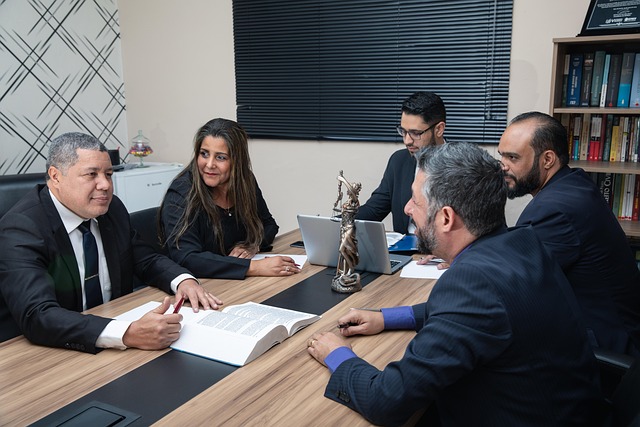Technology’s Transformative Role for Truck Accident Lawyers

Truck accident lawyers have seen a profound shift in their practices due to technology integration……..
In the vast landscape of legal services, specialized fields emerge to address unique challenges, and one such area is truck accident law. This niche practice focuses on advocating for individuals injured in commercial vehicle collisions, ensuring justice and fair compensation. As road traffic continues to evolve with advancements in trucking technology, this field plays a pivotal role in mediating complex cases and holding accountable those responsible for unsafe practices. This article aims to provide an comprehensive exploration of truck accident law, shedding light on its intricacies, global impact, and the professionals dedicated to this critical sector.
Definition: A truck accident lawyer, also known as a commercial vehicle litigation attorney, is a legal expert specializing in representing victims involved in accidents involving large trucks, such as semi-trucks, 18-wheelers, and other commercial vehicles. These lawyers navigate the unique challenges posed by these cases, including complex insurance policies, federal regulations, and often, high-stakes litigation.
Core Components:
Personal Injury Law: At its foundation, this practice draws heavily from personal injury law, focusing on establishing liability for the driver, owner, or company responsible for the truck. This involves investigating the accident scene, gathering evidence, and constructing a compelling narrative to support claims.
Federal Regulations: Commercial vehicles operate under stringent federal regulations, such as those enforced by the Federal Motor Carrier Safety Administration (FMCSA). Truck accident lawyers must possess expertise in interpreting these rules, which cover driver hours of service, vehicle maintenance, and safety standards, to build strong cases.
Insurance Law: The insurance industry plays a significant role in truck accidents due to complex policies tailored for commercial fleets. Lawyers in this field understand how to navigate policy exclusions, coverage limits, and subrogation claims to secure fair compensation for clients.
Historical Context: The modern truck accident lawyer has evolved alongside advancements in trucking technology and increasing traffic congestion. As trucks became larger and more specialized, the legal challenges surrounding accidents grew complex. Over time, this niche practice developed to address these complexities, ensuring victims had access to specialized representation.
International Influence: Truck accident law transcends borders, as global trade and transportation networks create a need for consistent safety standards and legal frameworks. Many countries have adopted similar principles and regulations, ensuring a level of uniformity in how these cases are handled.
Regional Variations: Despite similarities, each region’s legal system adds its unique twist to truck accident litigation. For instance:
| Region | Key Trends/Considerations |
|---|---|
| North America | Strict liability rules for certain types of accidents; emphasis on driver training and hours-of-service regulations. |
| Europe | Harmonized safety standards across member states; complex insurance schemes with multiple parties involved. |
| Asia Pacific | Rapid urbanization leading to increased truck traffic in urban areas; focus on tort law and compensation for victims. |
| Middle East | Unique cultural and legal traditions; influence of Islamic law in personal injury claims. |
Emerging Trends:
Technology Integration: The adoption of advanced driver-assistance systems (ADAS) and autonomous vehicles is transforming the industry. Lawyers must adapt to new liability frameworks for these technologies, balancing safety innovations with accountability.
Global Supply Chain Management: With global trade comes increased complexity in liability determination when accidents involve multiple jurisdictions and companies. This requires a strategic approach to cross-border litigation.
Environmental Concerns: The growing focus on sustainability and environmental regulations is impacting trucking operations. Lawyers may navigate cases involving fuel efficiency standards, emissions-related accidents, or the impact of green initiatives on road safety.
Market Dynamics: The truck accident legal market is characterized by high competition, with specialized firms vying for clients. This dynamic is driven by factors such as case complexity, regional specialization, and the reputation of individual lawyers.
Investment Patterns: Law firms investing in this field often do so to diversify their practice areas and tap into a growing niche market. They may allocate resources to research, technology, and talent development to stay ahead of industry trends.
Economic Impact:
Compensation Payments: Truck accident cases can result in substantial compensation for victims, including medical expenses, lost wages, and pain and suffering. These payouts contribute to the overall economic well-being of affected individuals and communities.
Insurance Premiums: The cost of insurance for commercial truck operators is influenced by legal outcomes and claims history. High-profile or complex cases can lead to rate increases, impacting the profitability of trucking companies.
Economic Development: In regions with robust trucking industries, efficient legal processes support economic growth by ensuring safe and reliable transportation networks. Conversely, ineffective or costly litigation could hinder trade and investment.
Advanced Driver Assistance Systems (ADAS): These systems, including lane departure warning, collision avoidance, and adaptive cruise control, have shown significant promise in reducing accidents. Lawyers must stay abreast of technological advancements to understand liability shifts and new safety standards.
Autonomous Vehicles: The development of self-driving trucks presents a game-changer for the industry. As regulations evolve, lawyers will play a crucial role in defining legal frameworks for autonomous vehicle accidents, ensuring accountability while fostering innovation.
Telematics and Data Analysis: Telematics devices in trucks provide valuable data on driver behavior, vehicle performance, and route efficiency. Lawyers can leverage this data to strengthen cases, demonstrate negligence, or support arguments for improved safety measures.
Virtual Reality (VR) Simulations: VR technology enables the recreation of accident scenes, providing a powerful tool for legal professionals to prepare for trials and settlements. It offers a cost-effective way to visualize scenarios, enhance client communication, and train staff.
Federal Laws and Regulations:
Motor Carrier Safety Administration (MCSA): In the US, the MCSA sets safety standards for commercial drivers, including medical fitness, vehicle inspection, and training requirements. Lawyers must understand these regulations to ensure compliance and defend against violations.
Road Safety Legislation: Many countries have enacted comprehensive road safety laws addressing speed limits, drug and alcohol restrictions, and vehicle maintenance standards. Non-compliance with these laws can significantly impact litigation outcomes.
International Agreements: Cross-border trucking operations are governed by international agreements like the Tokyo Convention (1968) and the European Agreement on Road Traffic (1970). These treaties establish uniform rules for driver licensing, vehicle registration, and liability in road accidents.
State/Provincial Laws: Local laws often fill gaps left by federal regulations, addressing issues such as personal injury claims, wrongful death suits, and insurance coverage specifics. Lawyers must be well-versed in these variations to provide effective representation.
Main Challenges:
Complex Liability Determinations: Truck accident cases often involve multiple parties, including drivers, trucking companies, load owners, and manufacturers. Assigning liability accurately is a significant challenge, requiring in-depth investigations and legal expertise.
Substantial Insurance Policies: Commercial vehicles are typically insured with high-limit policies, which can complicate settlement negotiations and lead to lengthy litigation. Lawyers must possess strong negotiation skills and a deep understanding of insurance law.
Expert Witness Testimony: Building credible expert witness testimony is crucial for establishing negligence. Lawyers invest significant resources in retaining and preparing experts who can provide valuable insights into accident reconstruction and industry standards.
Criticisms and Solutions:
Costly Litigation: Some critics argue that truck accident litigation is inherently expensive, with high attorney fees and protracted court battles. To address this, firms can employ innovative fee structures, such as contingency fees or reduced rates for smaller cases, making legal aid more accessible.
Lack of Public Awareness: Limited public understanding of trucking regulations and safety practices may hinder client acquisition. Educational campaigns and community outreach programs can raise awareness, fostering trust in the legal profession.
Industry Lobbying: Trucking industry lobby groups often influence legislation, potentially affecting legal outcomes. Lawyers can counter this by advocating for balanced legal reforms, collaborating with policymakers, and promoting transparency.
Case Study 1: The Dangerous Load
A semi-truck carrying hazardous materials skidded off a narrow mountain road, causing a devastating accident that led to multiple fatalities. The law firm representing the victims’ families conducted an extensive investigation, uncovering evidence of improper load securing practices by the trucking company. Through expert witness testimony and meticulous documentation, they secured a substantial settlement, setting a precedent for holding carriers accountable for unsafe loading practices.
Case Study 2: Autopilot Failures
A client, Mr. Johnson, was involved in a collision while driving his commercial vehicle equipped with advanced driver assistance systems (ADAS). The lawyer representing him discovered that the ADAS had failed to detect an obstacle due to a software glitch. Through thorough technical analysis and expert testimony, they successfully argued for product liability, resulting in a significant payout for Mr. Johnson’s injuries.
Case Study 3: Cross-Border Dispute
A multinational law firm took on a complex case involving a cross-border truck accident between two countries with differing legal systems. By employing a strategic approach, leveraging international agreements, and conducting thorough research into local laws, they secured a favorable settlement, demonstrating the importance of global legal expertise in this field.
Emerging Technologies: The future of truck accident law is closely tied to technological advancements. As autonomous vehicles gain traction, lawyers will need to adapt their strategies for liability determination and safety regulation. This may involve collaborating with technologists and engineers to understand the nuances of new vehicle systems.
Data Analytics and AI: Artificial intelligence (AI) and data analytics can revolutionize case preparation, enabling lawyers to analyze vast amounts of data quickly and accurately. Predictive analytics may also assist in settlement negotiations and risk assessment.
Global Harmonization: Efforts towards legal harmonization between jurisdictions will continue to shape this field. Standardized regulations and consistent interpretations of laws across borders will make international trucking operations more efficient and predictable.
Sustainability Focus: With the increasing emphasis on environmental sustainability, lawyers may play a pivotal role in advocating for greener trucking practices, including fuel-efficient technologies and alternative energy sources. This could involve collaborating with policymakers and industry leaders to draft sustainable transportation laws.
Truck accident law is a dynamic and critical component of ensuring road safety and providing justice for victims. As technology advances, legal professionals in this field must stay agile, embracing new tools and methodologies while adapting to evolving regulatory landscapes. By addressing challenges head-on, leveraging technological advancements, and fostering international cooperation, truck accident lawyers contribute significantly to the overall well-being of societies worldwide.
Q: What types of compensation can victims expect in a successful truck accident case?
A: Victims may be entitled to various forms of compensation, including medical expenses, lost wages, pain and suffering, emotional distress, property damage, and, in some cases, punitive damages for willful or reckless behavior. The specific awards depend on the jurisdiction and the unique circumstances of each case.
Q: How long does it typically take to resolve a truck accident case?
A: Case resolution times vary widely. Simple cases may be resolved within a few months, while complex litigation can take years. Factors influencing duration include the severity of injuries, availability of evidence, number of parties involved, and legal complexities.
Q: Are there any specific qualifications or certifications required for truck accident lawyers?
A: While there are no formal certifications, many truck accident lawyers possess advanced degrees in law, such as LLMs or JDs. Specialized training in personal injury law, transportation regulations, and trial advocacy is highly beneficial. Continuous professional development is essential to stay updated on industry trends.
Q: How can victims ensure they receive fair compensation after a truck accident?
A: Victims should seek medical attention immediately, document the accident scene with photos, gather contact information from witnesses, and report the incident to relevant authorities. Engaging an experienced truck accident lawyer who can investigate the case, build a solid legal strategy, and negotiate with insurance companies is crucial for achieving fair compensation.
Q: What are some common causes of truck accidents?
A: Truck accidents can result from various factors, including driver fatigue, poor weather conditions, vehicle maintenance issues, unsafe loading practices, driver distraction (e.g., mobile phones), speeding, and mechanical failures. Understanding these causes is essential for prevention and effective litigation strategies.

Truck accident lawyers have seen a profound shift in their practices due to technology integration……..

A truck accident lawyer plays a crucial role in helping victims navigate complex claims processes, f…….

Hiring a truck accident lawyer is a crucial step for victims seeking compensation, as their fees are…….

After a truck accident, a truck accident lawyer is essential for securing justice and compensation……..

Truck accidents involve complex legal issues due to regulations and operational intricacies. A truck…….

After a devastating truck accident, a truck accident lawyer provides essential guidance and support……..

After a truck accident, immediate medical care is essential, and engaging an experienced truck accid…….

Truck accident lawsuits require specialized legal expertise due to the complex nature of commercial…….

A truck accident lawyer is crucial for securing justice and fair compensation after a commercial veh…….